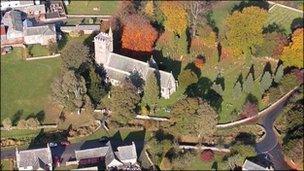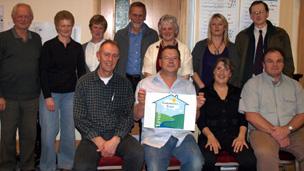Volunteers speak up for Big Society
- Published
Confusion and criticism have engulfed the government's plan for a Big Society.
And although Labour-run Liverpool recently pulled out, some of those involved in the remaining three pilot council areas say their involvement is bringing benefits.
Months before Prime Minister David Cameron launched his Big Society initiative with the aim of empowering local communities, villagers in Cumbria were making plans to build their own homes.

Villagers want youngsters to be able to buy homes in Crosby Ravensworth [Visit.cumbria.com photo]
A survey identifying the need for 23 affordable homes in Crosby Ravensworth led parish councillors to seek volunteers to help achieve that goal.
The scheme has since become one of dozens of community-led projects taking place in Eden Valley.
It is one of three remaining "Big Society vanguard areas", all of which are controlled by the Conservatives, the Liberal Democrats or coalitions involving one of the two.
Last month, Lyvennet Community Trust, made up of 11 volunteers, was given planning permission for a £1.8m housing scheme which will bring 12 affordable homes to Crosby Ravensworth.
The aim is to allow the village to be enjoyed by all generations, in a place the trust said had experienced an average house price over the past five years of £300,000.
David Graham, of the trust, said: "Being involved in the Big Society and getting help and advice, such as from people from the Communities and Local Government department, has been exceptionally helpful.
"It helped get us through some of the bureaucracy that we were starting to come up against."
He said the trust had to go through many stages, including registering as a housing association and securing funding from a range of bodies, including the Charities Aid Foundation, to buy a derelict brownfield site.
"There is money out there but part of the problem is finding it," Mr Graham said.
"Being part of the Big Society helped us find the little pots of money available, as well as cheap loans and grants of £5,000 to £10,000."
The trust recently secured a £660,000 grant from the Homes and Community Agency (HCA) which set it a March deadline to find a builder and secure further funding.
Mr Graham, 53, said: "My wife says she has become a housing widow, I spend so much time on the project."
But not everyone is as positive about the Big Society.
Among criticisms levelled at the initiative is that it is costing cash-strapped councils money.
Last week Liverpool pulled out, with the council saying the loss of more than £100m in government grants to the city had put many existing voluntary groups at risk.
But Eden District Council, a Conservative and Independent Alliance coalition, said the Big Society was costing it little except in terms of council officers' time advising groups.
The council, which has reduced grants and funding to voluntary organisations as part of its £1.1m savings, said it was working closely with communities to help meet their needs as part of the Big Society initiative.
Council leader Gordon Nicolson re-pledged the authority's commitment to the scheme and said he was pleased with the progress of projects.
Eden Valley initiatives include a campaign to get people to buy locally, moves to supply fast broadband services to rural areas and a hydro-power scheme for the River Eden.

David Graham (centre with logo) said the trust had been given a lot of help
Unveiling the four vanguard areas last July, Mr Cameron said they would be training grounds for his Big Society vision which represented a "big advance for people power".
The government said the varied communities - rural, suburban and urban - had different approaches and ideas. And he said the schemes were identifying barriers to local power which could be removed.
And council leaders in the other two vanguard areas, Windsor and Maidenhead and Sutton, said being involved was bringing benefits in spite of the cuts.
David Burbage, leader of Conservative-run Windsor and Maidenhead council, said the aim was to make schemes work without being dependent on public money.
Projects in the area include a Care Bank, where people can earn credits for their future care by helping others.
And more than 60 residents and five schools are involved in an Adopt a Street scheme which aims to improve the environment.
In Sutton, where the council will lose about £27m in government funding over two years - more than 20% of its total budget - the authority said it was involving residents in its thorough review of services to help meet this target.
The council said its Big Society schemes were providing additional benefits to the traditional work of the council.
Under one scheme, road stewards were surveying the condition of roads and had identified nearly 90 potholes which needed to be fixed quickly.
Sean Brennan, leader of the Liberal Democrat run-council, said many people were keen to play a more active role in their communities.
"The Big Society is actually very simple. It's about local people knowing what's going on, being able to have their say and get involved in the running of their area if they want to."
- Published9 February 2011
- Published7 February 2011
- Published3 February 2011
- Published14 February 2011